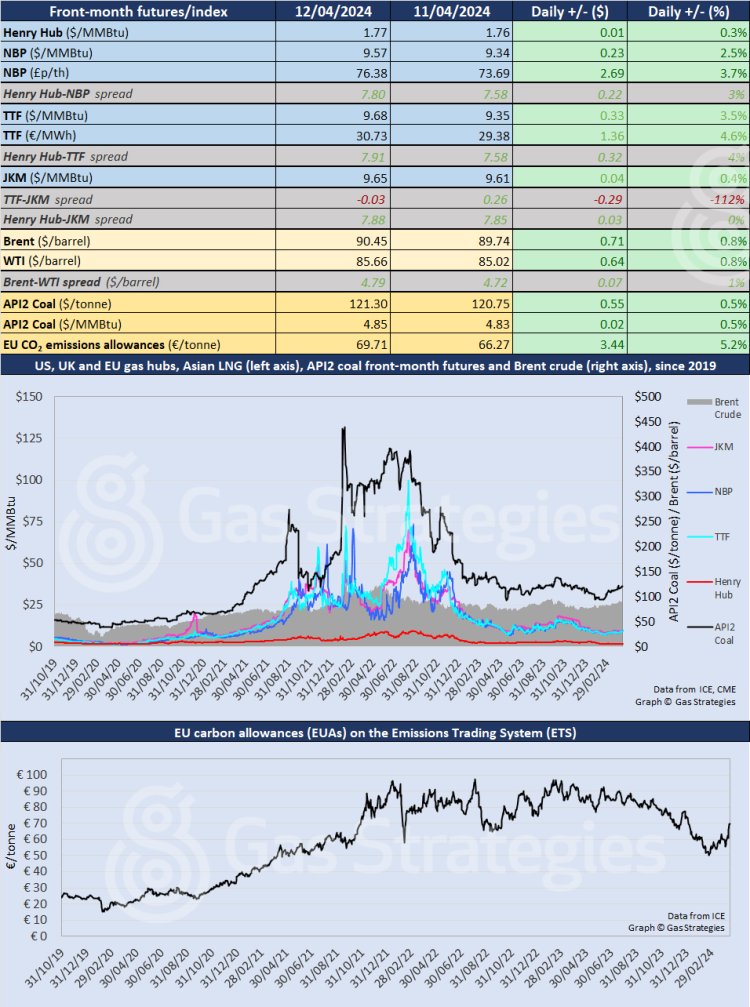Energy and carbon prices rose across the board on Friday as anticipation built of an imminent and unprecedented direct attack on Israel by Iran. However, there has been no sign of panic on markets – then or since – despite the attack materialising, in the form predicted by US intelligence sources, late on Saturday.
More than 300 drones and ballistic and cruise missiles were directed at Israel but most were shot down by the military forces of Israel and its allies – mainly the US and the UK – with some destroyed by Jordan as they crossed its airspace.
Iran claims it achieved its objectives but the consensus among defence analysts is that the outcome must have been a disappointment – and a dent to Iran’s military credibility.
Nevertheless, there is universal agreement that Saturday’s attack marks a dangerous new phase in the geopolitics of the Middle East, with strenuous diplomatic efforts under way to prevent a wider conflagration.
Much now depends on what Israel chooses to do next. Its allies are urging it to “take the win” and stay its hand. The US, for its part, has stressed it will not participate in any retaliatory strike.
Little impact on Israel or markets
Brent crude oil futures closed up 0.8% on Friday, from USD 89.74/barrel on Thursday to USD 90.45/barrel. Significantly, the price was back below USD 90/barrel on Monday morning.
Similarly, WTI also rose by 0.8%, from USD 85.02/barrel to USD 85.66/barrel but was down below USD 85/barrel in early trading on Monday.
The rise in European natural gas prices was well within recent day-to-day volatility.
In Continental Europe, the May TTF contract climbed by 3.5%, from USD 9.35/MMBtu on Thursday to USD 9.68/MMBtu on Thursday.
Currency effects were significant. In local currency the price was up 4.6% to EUR 30.73/MWh, the highest front-month close since the first half of January. The price was back below EUR 30/MWh on Monday morning.
In the UK, NBP futures closed up 2.5%, from USD 9.34/MMBtu on Thursday to USD 9.57/MMBtu on Friday. In local currency terms the rise was 3.7% to 76.38 p/therm. NBP’s trajectory on Friday morning was similar to that of TTF – downwards.
In Asia, the JKM LNG price was little moved, edging up 0.4% to USD 9.65/MMBtu.
In the US, front-month Henry Hub closed up 0.3% to USD 1.77/MMBtu.
European carbon prices showed the largest rise of the day on Friday, up 5.2% from EUR 66.27/tonne on Thursday to EUR 69.71/tonne.
Front-month futures and indexes at last close with day-on-day changes (click to enlarge):
Time references based on London GMT. Brent, WTI, NBP, TTF and EU CO2 data from ICE. Henry Hub, JKM and API2 data from CME. Prices in USD/MMBtu based on exchange rates at last market close. All monetary values rounded to nearest whole cent/penny. Text and graphic copyright © Gas Strategies, all rights.
Subscription Benefits
Our three titles – LNG Business Review, Gas Matters and Gas Matters Today – tackle the biggest questions on global developments and major industry trends through a mixture of news, profiles and analysis.
LNG Business Review
LNG Business Review seeks to discover new truths about today’s LNG industry. It strives to widen market players’ scope of reference by actively engaging with events, offering new perspectives while challenging existing ones, and never shying away from being a platform for debate.
Gas Matters
Gas Matters digs deep into the stories of today, keeping the challenges of tomorrow in its sights. Weekly features and interviews, informed by unrivalled in-house expertise, offer a fresh perspective on events as well as thoughtful, intelligent analysis that dares to challenge the status quo.
Gas Matters Today
Gas Matters Today cuts through the bluster of online news and views to offer trustworthy, informed perspectives on major events shaping the gas and LNG industries. This daily news service provides unparalleled insight by drawing on the collective knowledge of in-house reporters, specialist contributors and extensive archive to go beyond the headlines, making it essential reading for gas industry professionals.






